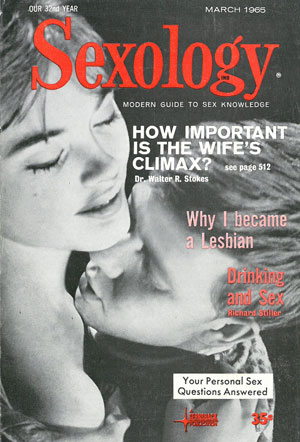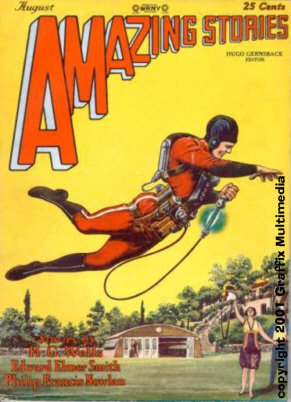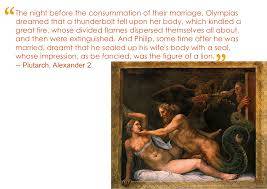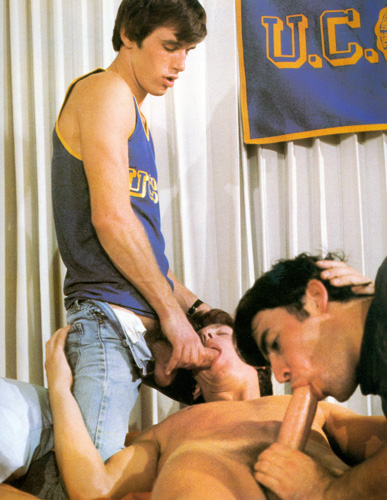Sexology in 1965
By Madam Bubby

In March 1965, the sex education magazine Sexology, which came out in the early 1930s as the brainchild of Hugo Gernsback, addressed still at that time risque subjects such as female orgasm, lesbianism, homosexuality, and, showing the increasing interest in Eastern culture, the Kama Sutra.
The physical culture movement, which really took off in the early part of the last century and which fed into the homoerotic muscle/physique magazines of Bob Mizer and others, had condemned prudery about sexual issues but still held up heterosexual marriage as the ideal situation in which to enjoy sex.
Sexology reflected most of the psychosocial attitudes of that time, but after the famous Kinsey Report, when this issue came out, previous views about sexuality that relied on social conceptions of "normality" and prudishness about the body's physical functions were beginning to come under serious scrutiny.
Gernsback, actually more famous for publishing the first science fiction magazine, Amazing Stories, was still the publisher and editor-in-chief when this issue came out.

In 1965, the United States was beginning to more fully experience a cultural revolution, especially in larger cities. The Baby Boomers had become young adults who were questioning the 1950s ideals about gender and sexuality, while the dissemination of the birth control bill created, especially for women, a view that emphasized the pursuit of individual happiness (which could mean a healthy, enjoyable sex life) rather than traditional values that emphasized church, kitchen, and children.
Homosexuality was still a taboo subject, and homosexual acts still illegal in many states, but under the influence of a more confessional culture that was beginning to allow for a more open discussion of feelings, people were finding an outlet to seriously discuss it in magazines like Sexology. It was no longer just a “dirty” subject to titillate or even shock as in the pulp fiction of the 1950s or the gossip rags like The Hollywood Reporter.
Even though the medical consensus, more specifically psychologists and psychiatrists, still considered homosexuality a “condition” or “problem” or even “disease” which needed to be treated, there were glimmers that this interpretation could be misguided, and that a homosexual person could not pretend to be or become a heterosexual. The letter discussed below (which is the question of the month, “Homosexual Anxiety”) from this issue shows that so many gay and lesbian persons ended up in heterosexual relationships and then marriages because it was the social norm, to often disastrous results.

A 23-year-old man writes to Dr. Rutledge, concerned that even though he is sexually active with women, he has often masturbates while thinking of men. He also notes he did not have gay sex while in the military (interesting, which could imply it was not unusual to do so!). He is afraid he will “fall” into homosexuality, and he wants to experience “normal” feelings again.
The doctor's response pretty much shows that the idea that sexual orientation is learned or conditioned was still prevalent, and sadly, for him it is still a “problem” with three possible causes. He claims gender confusion because of emotional problem in childhood (thus the boy thinks he is a girl), a typical stereotype during that time. Remember, this was long time before medical science began to understand transgender people, and that gender identity could be something different from sexual orientation.
He then claims - and this is where he could be grasping at the idea that maybe, just maybe, being gay is not a choice - that because of a problematic heterosexual family dynamic that “they turn their natural sexual interests toward the same sex rather than the opposite sex.” He does blame the family, but perhaps he is hinting that one could naturally be gay, and that a person could who identifies as gay is doing so to make one's life easier (quite a claim in this period!) because one does not have to worry about pregnancy and financially supporting a family. (Those are also reasons why many people, especially women, had been joining religious orders for centuries, but the price was no sex at all!)
Rutledge finally claims that extreme stress could cause one to have gay sex, in that case, a temporary aberration. Overall, he wants the person to get psychological help.
Now, this response these days doesn't particularly strike one as being enlightened in light of our medical discoveries, but just ten years later the American Psychological Association declared that being gay was not a problem or condition or abnormality, and that steps should be taken to remove its social stigma, which the writer of the letter (one might assume in these days he was bisexual) definitely feels.
And one should also take into account that another article in this issue affirms the physical and especially psychosocial importance of the female orgasm, long a taboo subject, and quite revolutionary for a generation whose mothers and grandmothers were taught to see the sex act as something fundamentally “dirty” and revolting to be endured only for the sake of producing children.
And, more significantly, one of the lead stories is an actual interview with a lesbian, even if the title, “How I Became A Lesbian,” implies that it is more a learned or developed behavior than an orientation.
Sexology ceased publication in 1983 after Gernsback sold it to another publisher, but its legacy lives on in countless other sex educators who counsel many, encouraging an open, diverse climate that celebrates the amazing spectrum of sexual and gender expressions and relationships - even while their work is hampered or put at risk by the recent upsurge in regressive reactionary movements against sex educational classes and books, against legislation protecting the rights of transgender people, against reproductive rights, and other anti-LGBTQ/anti-sex/anti-bodily autonomy agendas.
By the 1970s, the sexual revolution that had begun in the 1960s was in full swing, and in the heady days after Stonewall, gay men were beginning to interpret and share their sexual experiences and relationships on film. Check out some of our titles from that period on DVD at BijouWorld.com and streaming at BijouGayPorn.com!
Article updated 5/10/24 to reflect the current political climate





 And to add a possibly Freudian twist to Alexander's relationships with both men and women, his mother, the formidable Olympias, insisted her son was the son of the king of the gods, Zeus, not her husband. Olympias later ordered Eurydice and her child by Philip II to be murdered, in order to secure Alexander's position as king of Macedonia. She did not get along with her husband, Philip of Macedon, Alexander's father, and supposedly had him murdered. That is one Greek woman who managed to wield power, but only by denying that her connection to it was via a man.
And to add a possibly Freudian twist to Alexander's relationships with both men and women, his mother, the formidable Olympias, insisted her son was the son of the king of the gods, Zeus, not her husband. Olympias later ordered Eurydice and her child by Philip II to be murdered, in order to secure Alexander's position as king of Macedonia. She did not get along with her husband, Philip of Macedon, Alexander's father, and supposedly had him murdered. That is one Greek woman who managed to wield power, but only by denying that her connection to it was via a man.

 Join our Email List
Join our Email List Like Us on Facebook
Like Us on Facebook Instagram
Instagram Youtube
Youtube Follow Us on Twitter
Follow Us on Twitter Follow us on Pinterest
Follow us on Pinterest